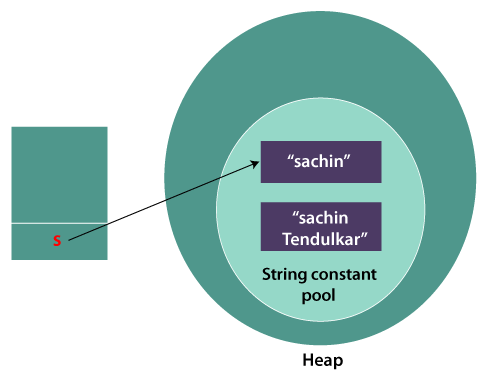What Is Unalterable Strings and Just How It Works
In the world of programming, understanding the idea of unalterable strings is vital for developing protected and durable applications. Immutable strings refer to strings that can not be changed after they are created, making certain information stability and predictability within the code. This fundamental concept plays an essential role in different programs languages and provides an one-of-a-kind technique to taking care of data. By exploring the complexities of how unalterable strings operate, one can discover a world of advantages and possibilities that can elevate the quality and efficiency of software application development.
The Essentials of Immutable Strings
Immutable strings, as an essential idea in programs, are personality series that can not be altered once they are produced. This implies that once a string is appointed a value, that value can not be changed. In languages like Python and Java, strings are immutable objects, resulting in different implications in regards to memory monitoring and data honesty.
One of the vital advantages of immutable strings is that they give a complacency in data control. Given that the material of an immutable string can not be changed, it makes sure that the initial data remains undamaged, minimizing the danger of unintentional modifications during program implementation (Why are strings immutable in Java?). This building additionally simplifies debugging procedures, as developers can trust that once a string is defined, its value will certainly not be inadvertently altered
When a new string is created based on an existing one, rather than modifying the initial string, the brand-new worth is stored independently. On the whole, comprehending the essentials of immutable strings is vital for understanding shows principles and optimizing code effectiveness.
Benefits of Unalterable Strings
Structure upon the security and efficiency advantages of unalterable strings, their benefits encompass boosting code integrity and simplifying concurrent programming jobs. By being unalterable, strings can not be modified after creation, which removes the danger of unintentional changes in the data they keep. This integral immutability ensures that when a string is created, its value remains constant throughout the program's implementation, minimizing the possibilities of bugs caused by unforeseen changes.
Additionally, immutable strings contribute to code integrity by making it simpler to reason about the state of a program. Because strings can not be altered, designers can trust that a string will constantly hold the same worth, simplifying debugging and maintenance efforts. This predictability brings about extra stable and dependable codebases.

Implementation in Programming Languages
Within various programs languages, the incorporation of immutable strings is an essential element that influences just how data is taken care of and adjusted within code structures. The application of immutable strings differs across different shows languages, with each language supplying its very own devices to support this principle.

On the other hand, languages like C and C++ do not have built-in assistance for unalterable strings. Developers in these languages should by hand carry out immutability by applying policies within their code to stop direct modifications to string objects.
Best Practices for Functioning With Immutable Strings
When handling immutable strings in programming languages like Java and Python, adhering to best practices guarantees efficient and secure data manipulation. Among the vital best practices is to make use of StringBuilder or StringBuffer rather than straight manipulating strings, especially when taking care of substantial concatenation operations. These courses give mutable choices for string adjustment, assisting to stay clear of unneeded memory appropriations and enhancing efficiency.
In addition, when functioning with sensitive data such as passwords or API tricks, it is critical to stay clear of storing them as ordinary message in immutable strings. Making use of safe and secure storage space mechanisms like char selections or specialized collections for handling sensitive info aids reduce protection dangers linked with unalterable strings.
Real-world Applications and Examples
Exploring sensible implementations of immutable strings discover this in various industries reveals their significant effect on data honesty and system dependability. In the medical care field, immutable strings play an important duty in guaranteeing the security and confidentiality of client information. By stopping unauthorized alterations to delicate info such as clinical documents and prescriptions, unalterable strings aid maintain conformity with stringent privacy guidelines like HIPAA.
Monetary establishments his response also gain from the immutable nature of strings to boost the safety of customer data and transaction documents. Immutable strings assist stop fraud and unapproved alterations to financial info, giving a robust protection versus cyber risks and making certain the count on and confidence of clients.

Conclusion
Finally, immutable strings are fixed and unchangeable sequences of personalities that provide advantages such as string security and improved performance in shows. They are applied in different programming languages to ensure information stability and safety. Best techniques for dealing with unalterable strings include avoiding direct modifications and utilizing techniques that return brand-new string items. Real-world applications of unalterable strings include data file encryption, caching, and string adjustment jobs.
Unalterable strings refer to strings that can not be changed after they why not find out more are produced, making certain data integrity and predictability within the code. When a brand-new string is created based on an existing one, instead than customizing the initial string, the new value is stored separately.In languages like Java and Python, strings are immutable by default, suggesting that when a string things is developed, its value can not be altered - Why are strings immutable in Java?. Ideal methods for functioning with immutable strings consist of staying clear of straight alterations and making use of techniques that return new string items. Real-world applications of immutable strings consist of data file encryption, caching, and string adjustment jobs
Comments on “Why Are Strings Immutable in Java? Enhancing Code Integrity”